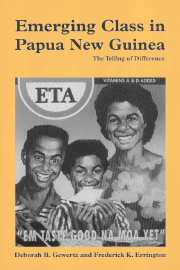Book contents
- Frontmatter
- Contents
- List of illustrations
- Acknowledgments
- Introduction: the twists and turns of difference
- 1 The middle class the (new) Melanesian way
- 2 How the grass roots became the poor
- 3 The realization of class exclusions
- 4 The hidden injuries of class
- 5 The problem(s) of the poor
- 6 Class and the definition of reasonability
- Conclusion: on dark nights of the soul
- Notes
- References
- Index
Conclusion: on dark nights of the soul
Published online by Cambridge University Press: 03 December 2009
- Frontmatter
- Contents
- List of illustrations
- Acknowledgments
- Introduction: the twists and turns of difference
- 1 The middle class the (new) Melanesian way
- 2 How the grass roots became the poor
- 3 The realization of class exclusions
- 4 The hidden injuries of class
- 5 The problem(s) of the poor
- 6 Class and the definition of reasonability
- Conclusion: on dark nights of the soul
- Notes
- References
- Index
Summary
We have shown in this book how new inequalities have come into being in a place generally characterized by its egalitarian ethos. The many stories we have told depict some of the ways the currents of global capitalism have allowed certain Papua New Guineans to use introduced forms in order both to establish new relationships and rework old ones. In short, certain Papua New Guineans have been able to redefine the ontological worth of themselves and others.
Specifically, we have shown how middle-class professionals redefined the nature of sociality; by using the connections they established through Rotary International, they (as descendants of indigenous “chiefs”) claimed new privileges and affirmed new exclusions. We have shown how middle-class businesswomen redefined the causes of poverty; by using marketing schemes such as OPT, they persuaded poor women that in such schemes there was equality of opportunity when in fact there was none. We have shown how members of the grass roots, such as Godfried and Michael, were wrenched, if not infuriated, when soccer referees, golfers and politicians denied them both equality and opportunity. And we have shown, finally, how a middle-class perspective concerning law and order, human rights and constitutionality has become the standard of reasonability on which sociality itself should be based.
What we have shown, in effect, has been the manner in which currents and forms of global capitalism have featured in the transformation of commensurate differences into incommensurate differences such that those who once contended on an even footing in the same relatively fluid, political field have become regarded – redefined – as ontologically inferior.
- Type
- Chapter
- Information
- Emerging Class in Papua New GuineaThe Telling of Difference, pp. 141 - 145Publisher: Cambridge University PressPrint publication year: 1999

